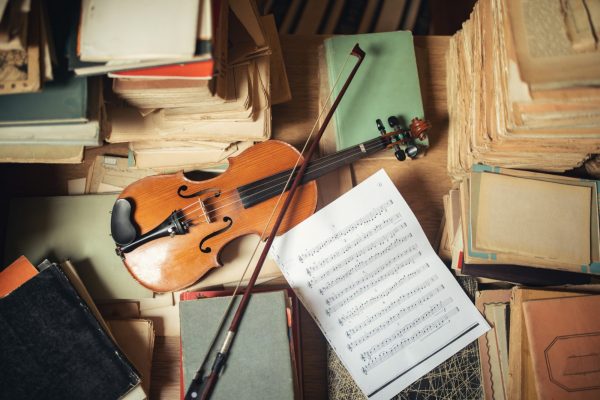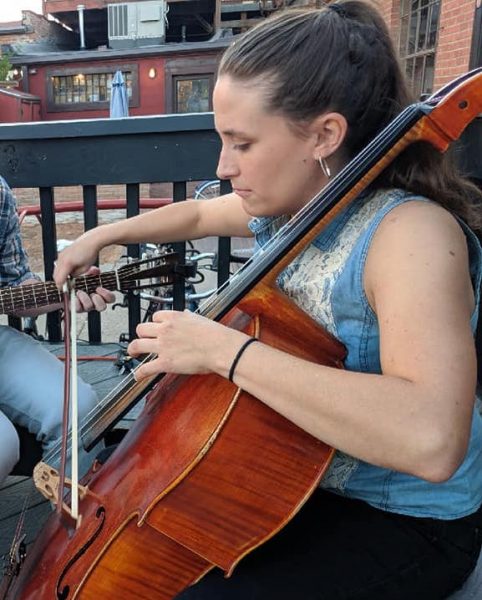
When she was eight years old, Domenica Romagni’s father suggested she start learning the violin. Not wanting to follow directions, she demanded to play “the cello” instead, thinking that “the cello” was a large brass instrument. Much to her chagrin, she discovered, as she sat down for her first lesson, that a cello was, in fact, very much like a big violin. Despite that initial disappointment, Romagni took to the instrument so fiercely that she pursued a degree in cello performance and plays the instrument to this day.

Trained at the Peabody Conservatory at Johns Hopkins University, Romagni received both a Bachelor of Music in cello performance and a Bachelor of Arts in philosophy. After a few years working as a freelance musician teaching cello and performing in various small ensembles, Romagni decided to pursue her other passion, studying for a doctorate in philosophy at Princeton University.
Deciding to pursue philosophy did not mean abandoning music, though. Much of Romagni’s philosophical work is dedicated to investigating questions that come up in the context of music and our perception of it. One fascinating connection that she explores is how music can arouse emotions and strengthen empathetic connection.
Music and Empathy
Researchers have attempted to connect the emotional resonances we hear in music to our most basic forms of emotional expression. For example, some consensus has formed regarding basic emotion types, like happiness, sadness, anger, fear, joy, and disgust, through the study of facial expressions and other bodily gestures. “Researchers believe there are certain contours in music that resemble the way that facial expressions convey emotion or the way body language expresses emotion,” Romagni says.
Whereas our recognition of aesthetic properties in art like beauty and gracefulness is quite varied, our sense of the emotional characteristics in music specifically is much more stable. [Many of us] recognize songs as happy, angry, or scary,” Romagni explains.
An example of this kind of emotional expression may be found in the way sadness is conveyed. The emotional recognition of sadness in music is widely shared. “Whenever you’re sad, you tend to move more slowly and you tend to be more sluggish. We associate a slow tempo and low tones in music to be markers for sad music,” she says. Romagni explains that we would question anyone who considers a funeral dirge to be an example of a happy song. “The musical contours and gestures of a dirge clearly communicate sadness and we insist that anyone who thinks otherwise must have misheard the music.”
But why is this the case? "How does music express emotion at all?,” Romagni asks. “And why are we so tuned into those properties of music when there are so many other properties to which we could attend? How do we perceive emotion in music in such a reliable way?”
Cultivation of the Soul
Part of Romagni’s research focuses on how 17th and 18th century developments in music theory helped to influence philosophical views on the fundamental nature of reality and the way we use our senses to perceive the world. Her recent work includes analysis of Descartes’ views on the aesthetic pleasure of musical consonance (when two or more sounds occur simultaneously and are complementary producing a pleasing sound), Spinoza’s concept of perfection as the basis for a theory of aesthetics (the nature of beauty and taste), and how Kant’s views on necessity in fine art inform our understanding of musical perception today.
The famed 17th century philosopher René Descartes claimed that "The basis of music is sound; its aim is to please and arouse various emotions in us... The human voice seems most pleasing to us because it is most directly attuned to our souls. By the same token, the voice of a close friend is more agreeable than the voice of an enemy because of sympathy or antipathy of feelings..."
Romagni explains, “In the history of music, the connection between music and emotion is so thoroughgoing. The idea of music as psychotherapy has been there from the start.” She points out the forefathers of our major philosophical traditions and their emphasis on musical training for character development. For example, in establishing his ideal vision of society in the Republic, Plato says, “What will [the guardians'] education be? Physical training for bodies, and music and poetry for the soul."
"In the history of music, the connection between music and emotion is so thoroughgoing. The idea of music as psychotherapy has been there from the start."
— Domenica Romagni
Plato expounds upon the specific features of music that shape our very being: “Rhythm and harmony permeate the inner part of the soul more than anything else, affecting it most strongly and bringing it grace, so that if someone is properly educated in music and poetry, it makes him graceful, but if not, then the opposite." More specifically, different kinds of music with different emotional resonances were thought to draw out and strengthen particular virtues in different classes within society, such as wisdom for the guardians and bravery for the auxiliaries.
We see a similar emphasis on musical training for character cultivation in ancient Chinese philosophy. In the Analects, Confucius remarks, “Find inspiration in the Odes, take your place through ritual, and achieve perfection with music.” In addition to training with the right kind of music to attain the role of an exemplary person, Confucius advises to stay away from the wrong kind of music. He says, “As for music, listen only to the Shao and Wu. Prohibit the tunes of Zheng, and keep glib people at a distance—for the tunes of Zheng are licentious, and glib people are dangerous.”

Music as Therapy
Just as music was used in ancient times to train the soul and create virtuous characters, music has been increasingly used today as a therapy for the rehabilitation and maintenance of mental, physical, and emotional health. Romagni is interested in the close connection between music and emotional recognition and intelligence, and how we can understand what others are feeling. This work is especially salient for those who have difficulty detecting emotion, such as those with autism spectrum disorder. Music therapy offers promising results for autistic patients learning how to recognize emotions, develop emotional intelligence, and navigate emotional and social landscapes more fluidly.
“The point of music in ancient times was to cultivate certain virtues in the soul. And it seems like contemporary theorists are still thinking about this,” she says. “They’re wondering how we can use music to treat particular mood disorders, or depression and anxiety. It seems that music taps into this deep emotional connection more reliably than any other art form.”
